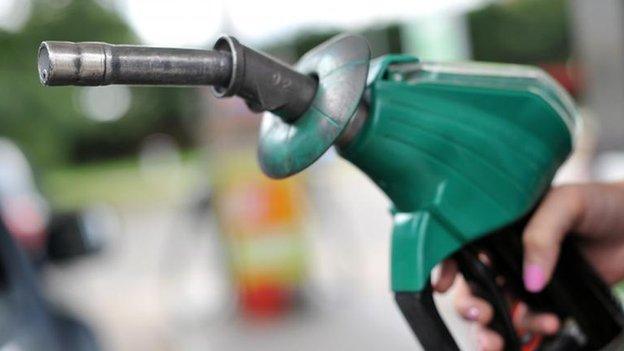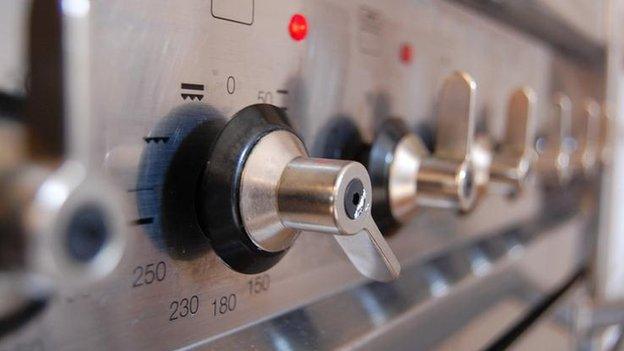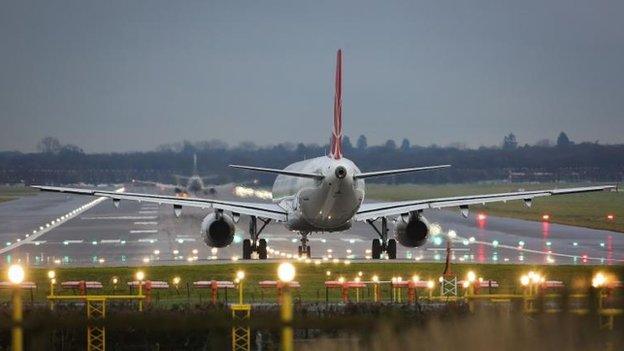Oil price falls: Will consumers benefit?
- Published

Consumers suspect prices will rocket up when the oil price increases
Should oil prices continue to fall, expect plenty of talk of rockets and feathers.
This is not a discussion about the costs of launching a spaceship. It refers to a long-held suspicion regarding the effect of the price of oil on consumers' finances.
The cost of petrol and domestic energy are said to rise like a rocket when the oil price goes up.
However, the claim is that they only drift down slowly, like a feather, when the oil price comes down, much to the benefit of suppliers.
Case for drivers

Supermarkets are already embarked in a battle over prices
The plunging price of oil has rekindled the debate over whether drivers, householders, and travellers are feeling the benefit.
On Wednesday, the price of Brent crude oil fell below $50 a barrel for the first time since May 2009.
This came in the same week as a supermarket scrap for motorists' custom became more feisty. Various retailers were lowering prices by two pence a litre during the week.
This took the average price of a litre of unleaded to 110.25p on Tuesday, according to figures from Experian Catalist. At the same time a year ago, the price was about 131p.
Seeing about £10 come off the cost of filling an average-sized family car is probably the most obvious benefit of falling oil prices on family finances.
There could be more good news. Mike Coupe, chief executive of major supermarket chain Sainsbury's, has told the BBC that the cost of a litre of unleaded could fall below the £1 barrier.
That, according to Simon Williams, RAC fuel spokesman, may be a promotional tool by a petrol provider, as lower and lower prices eventually hit a point where other factors have a greater influence on the cost.
He says that roughly £42 of a £61 fill-up cost at the pump goes on VAT and fuel duty - taxes that go to the Treasury which suppliers, even the supermarkets, can do nothing about.
Another factor is that fuel is traded in dollars. The dollar has strengthened against the pound which has curtailed some of the potential benefits for drivers.
Case for householders

The major energy companies have faced questions over prices
Pressure is mounting on the domestic gas and electricity suppliers to cut their prices as a result of recent events.
The link between oil prices and gas prices is partial, rather than direct, but over time they have moved in tandem.
The rocket and feather criticism is often levelled at the big six energy companies, though their trade body Energy UK says that prices have been coming down.
"When people shop around, they can easily find deals that are over £100 cheaper than this time last year and in line with cuts in wholesale energy prices," says Lawrence Slade, chief executive of Energy UK.
Yet this refers to fixed rate deals used by about 40% of customers. There has been no move, and an increasing gap in price, to standard energy tariffs since oil prices started coming down - a point emphasised by regulator Ofgem.
"I made it clear last summer that I believe that energy suppliers need to be able to explain the gap between retail and wholesale prices and I stand by that," says Dermot Nolan, chief executive of Ofgem.
"It is up to them to explain why falling wholesale prices have not yet fed through to the 60% of customers on standard energy tariffs."
Analysts suggest there is room for manoeuvre, with price cuts of at least a few percentage points possible now.
Mark Todd, of price comparison website Energyhelpline,com, suggests that even bigger price cuts averaging £129, or 9.7% per household, per year could be found. This allows for the fact that many energy companies bought much of their wholesale gas well in advance to counter any price shocks.
However, politics also plays a part in the equation.
Chancellor George Osborne wrote on social media this week that industries like the domestic energy sector were being watched "like hawks" to ensure oil price falls were reflected in bills.
Labour has vowed a price freeze if it wins the general election in May, and it has been said that energy companies will not want to reduce prices now and find they might have to raise them again just before the election to avoid getting stuck with them. Suppliers can cut prices immediately but have to give 30 days' notice of a price rise.
Labour have also said that the regulator should have the power to force energy companies to cut prices if wholesale prices fall.
Case for travellers

Fuel surcharges are a factor for many frequent flyers
Travellers on many airlines have to pay a fuel surcharge ranging from about £19 for a short-haul flight to more than £200 for a return flight from London to the US.
These started about 10 years ago as airlines pointed out that some costs were beyond their control. Some airlines still simply include this in the headline ticket price.
So are these prices falling?
Virgin Atlantic says it reduced its surcharge by about £10 for return flights to the US before Christmas. Easyjet also said it had reduced ticket prices.
But most of the major airlines, as with the domestic energy companies, say the way they buy their fuel limits the potential price cuts for travellers.
Airlines buy their fuel ahead to factor out any price shocks and, as a result, they say they have little wiggle room, despite the recent decline in oil prices.
For example, Easyjet says less than 20% of its fuel this financial year and less than half its fuel in the 2016 financial year has yet to be bought.
IAG, the owner of British Airways, makes a similar point. It also claims that the strength of the dollar has offset any potential savings.
In any case, IAG says, the fuel surcharge has failed to recover the extra costs that the airlines faced from oil price rises starting more than 10 years ago.